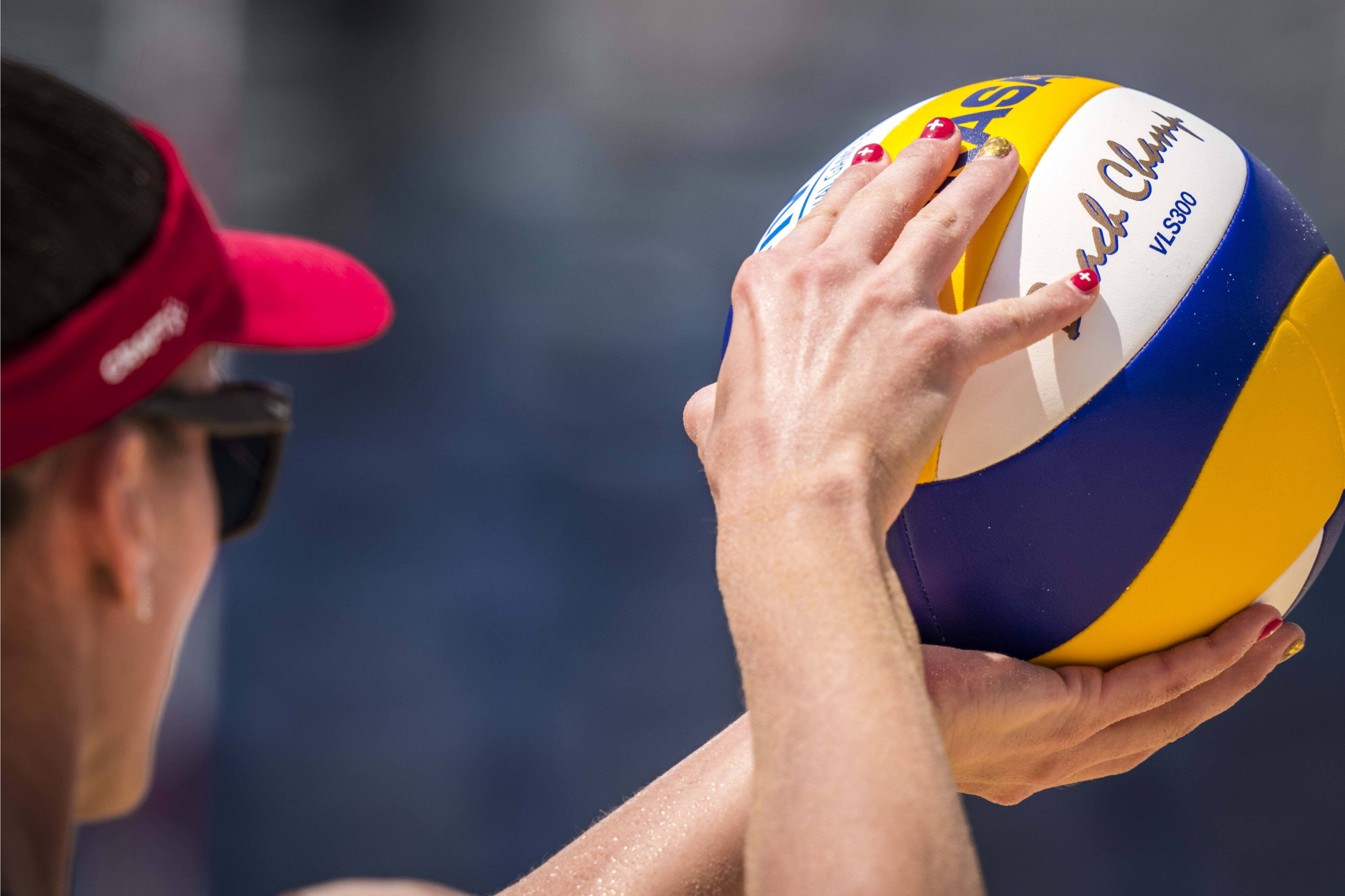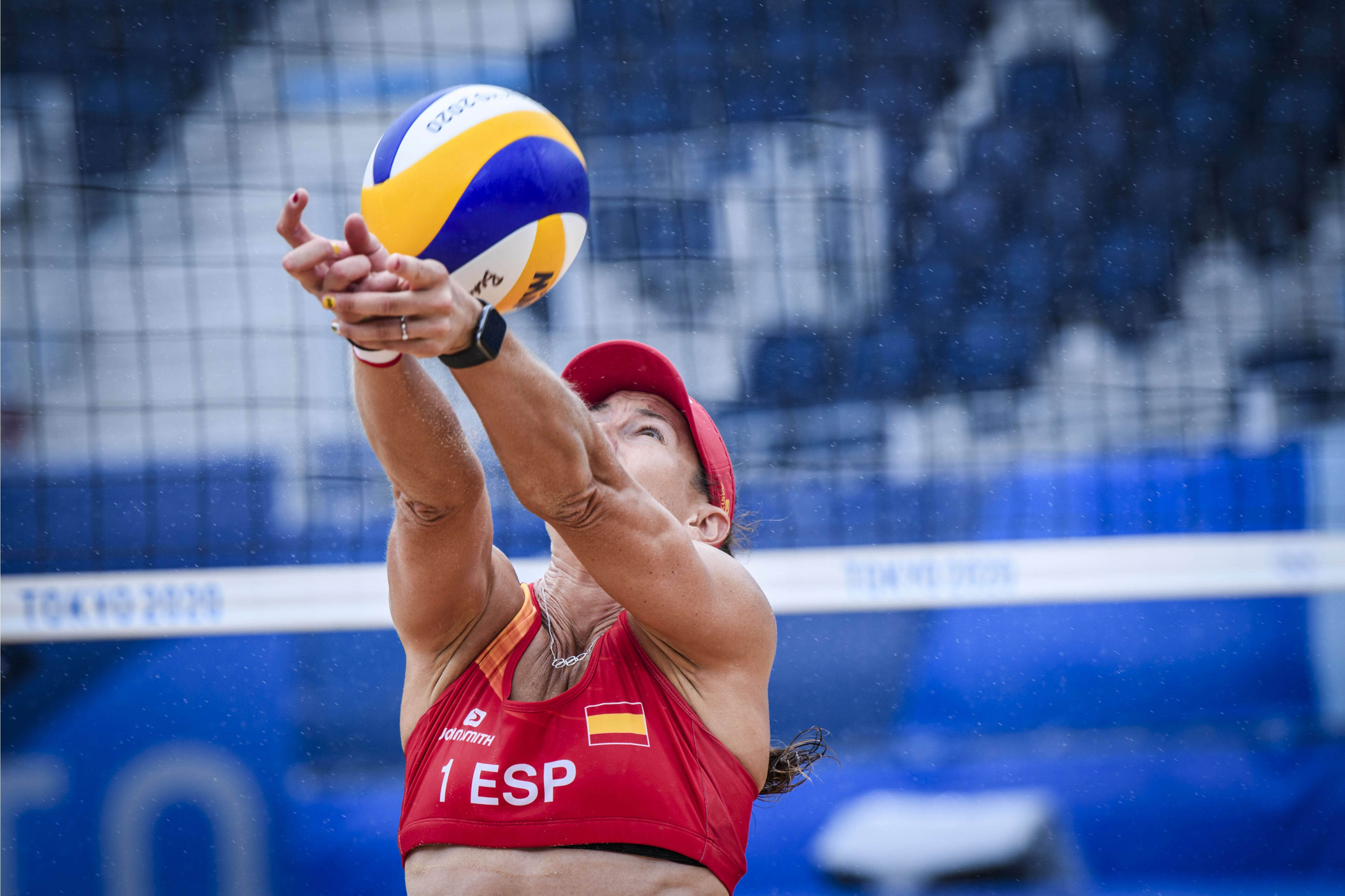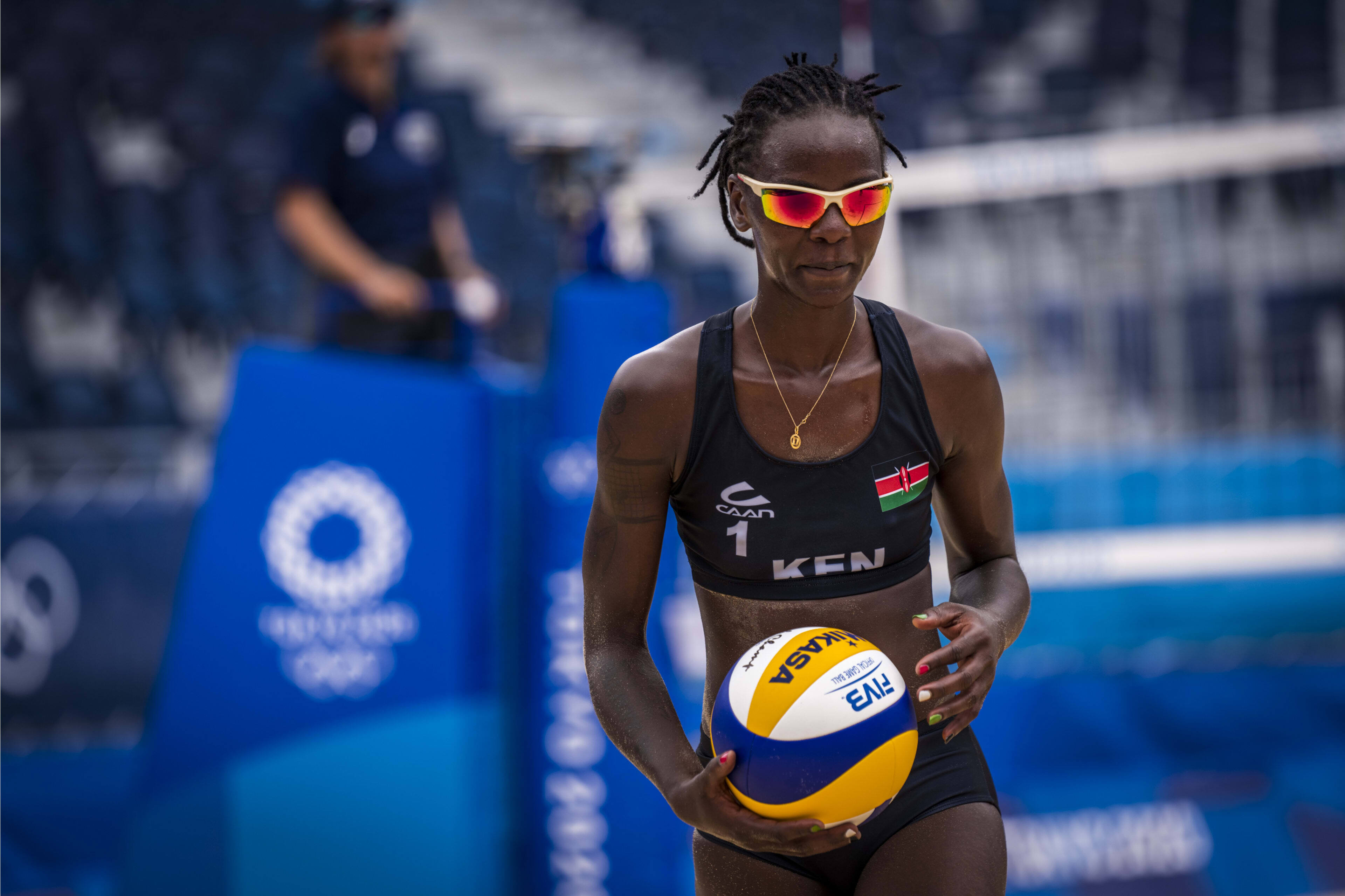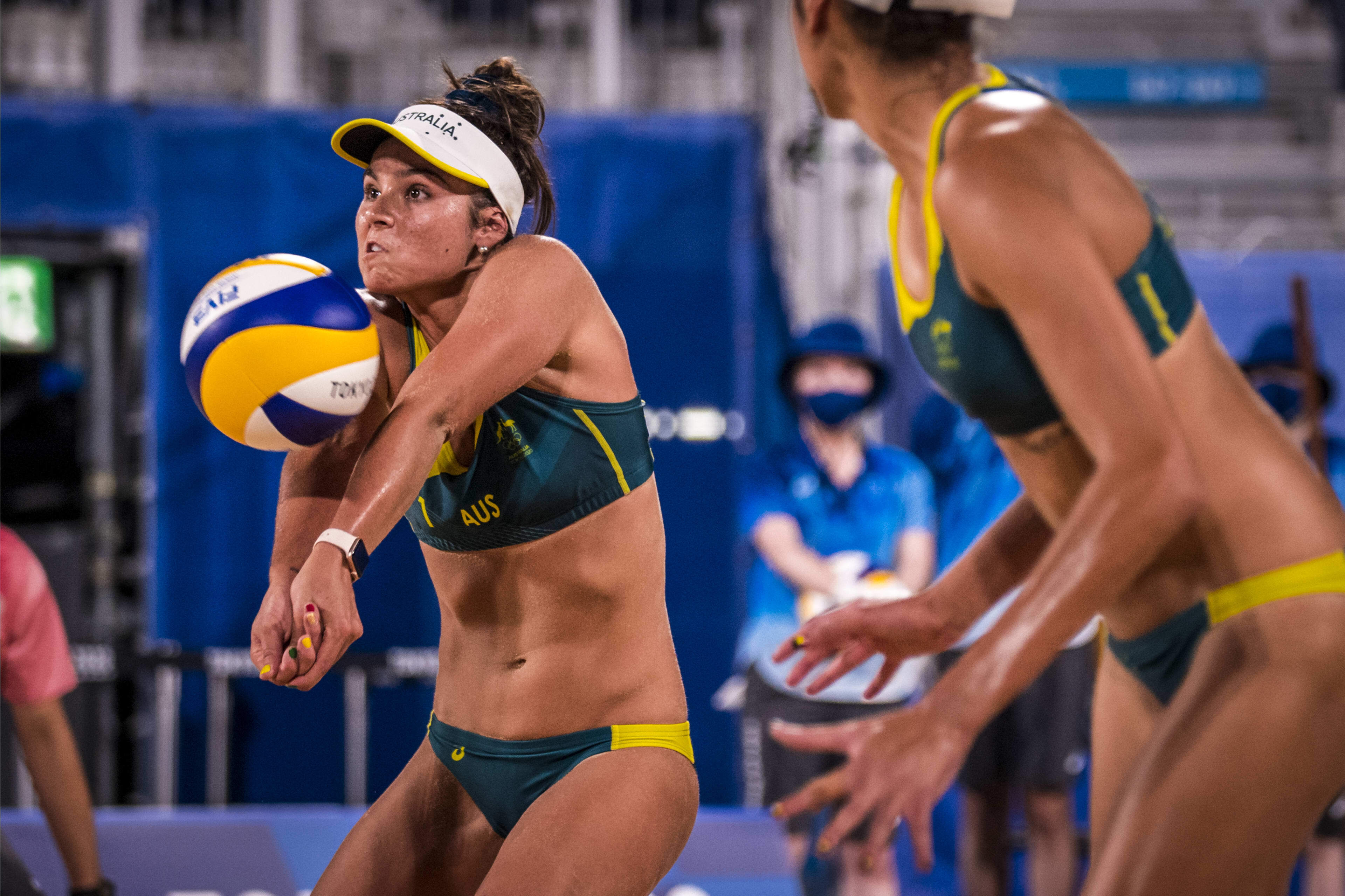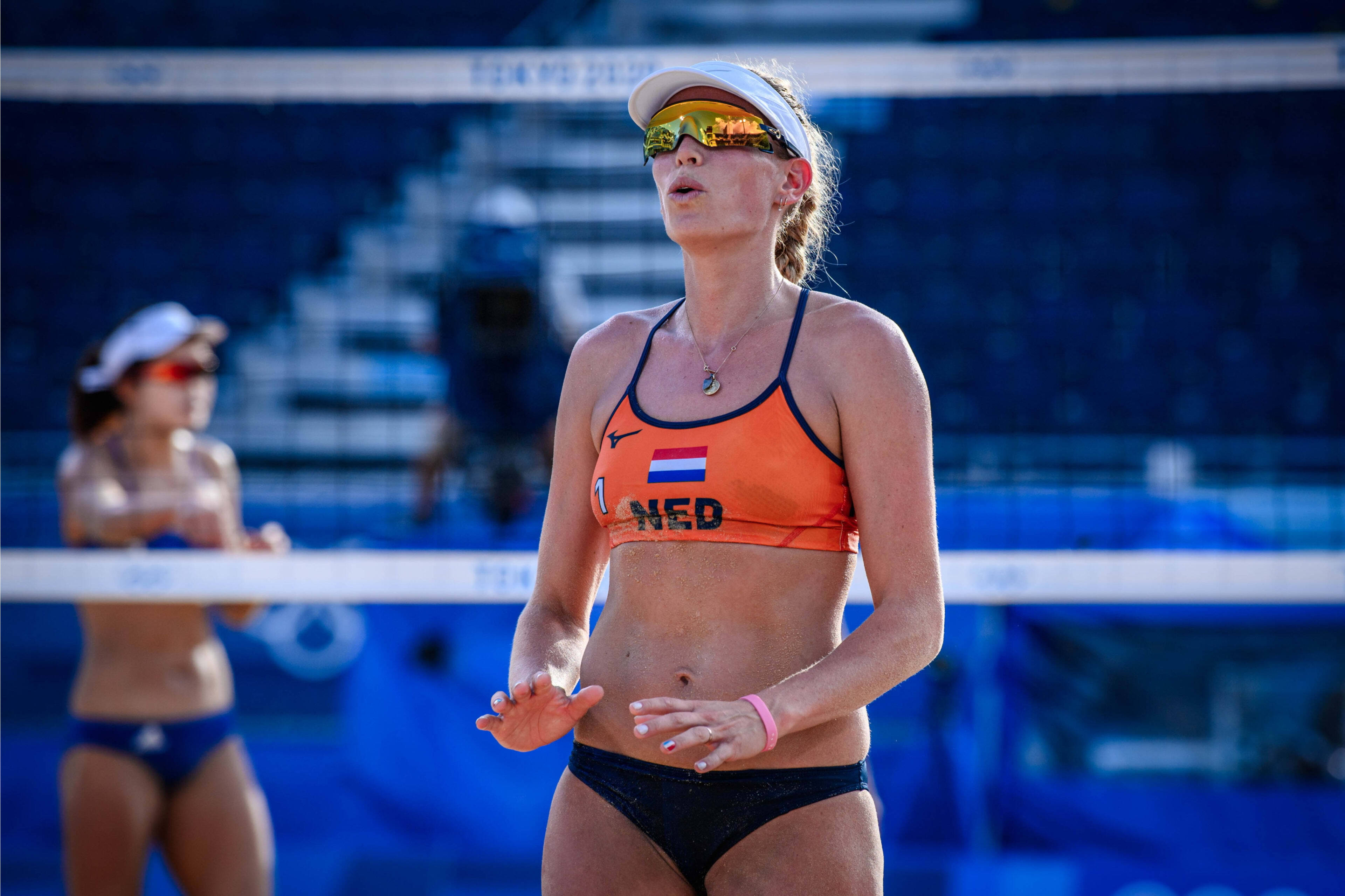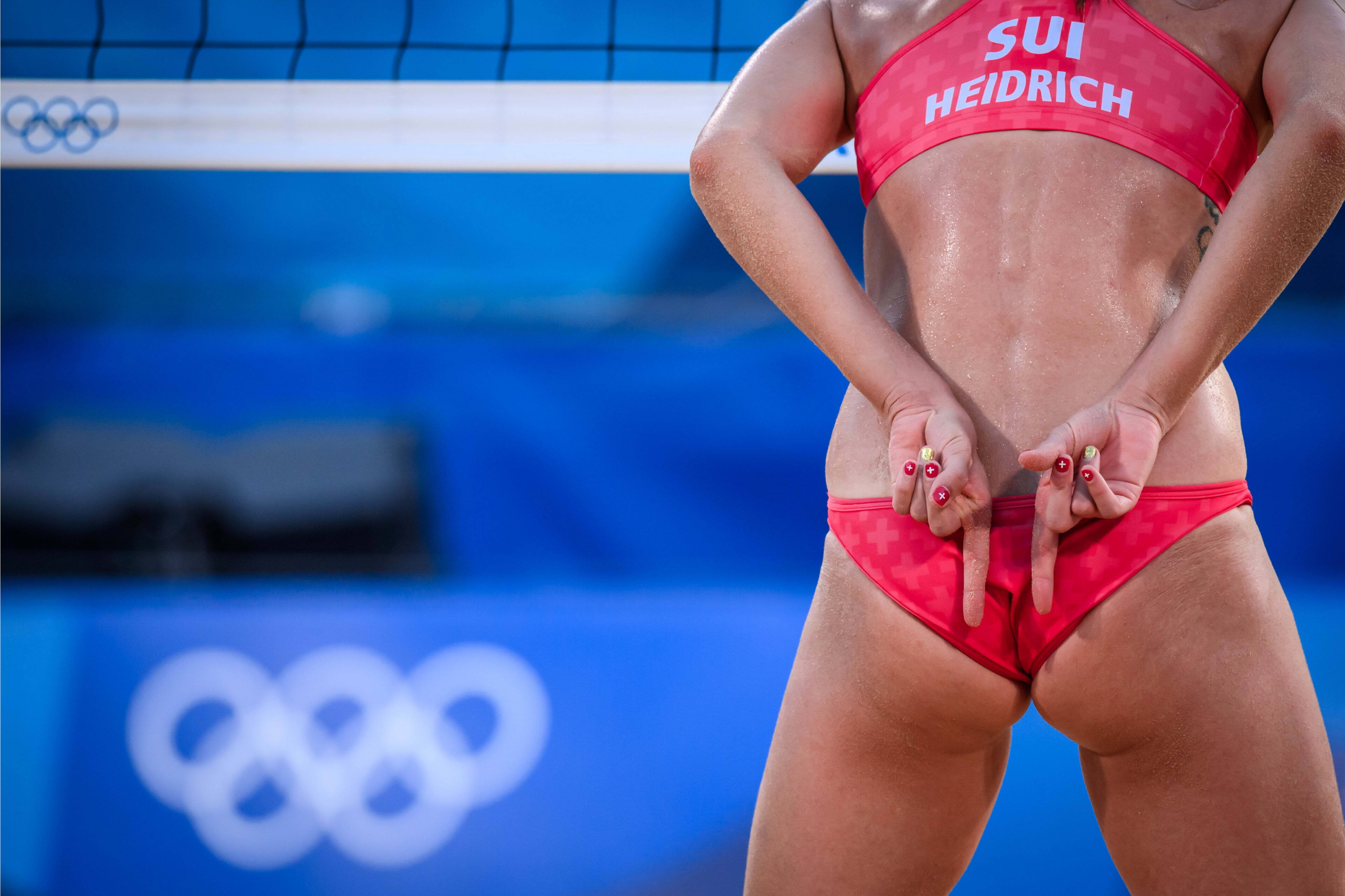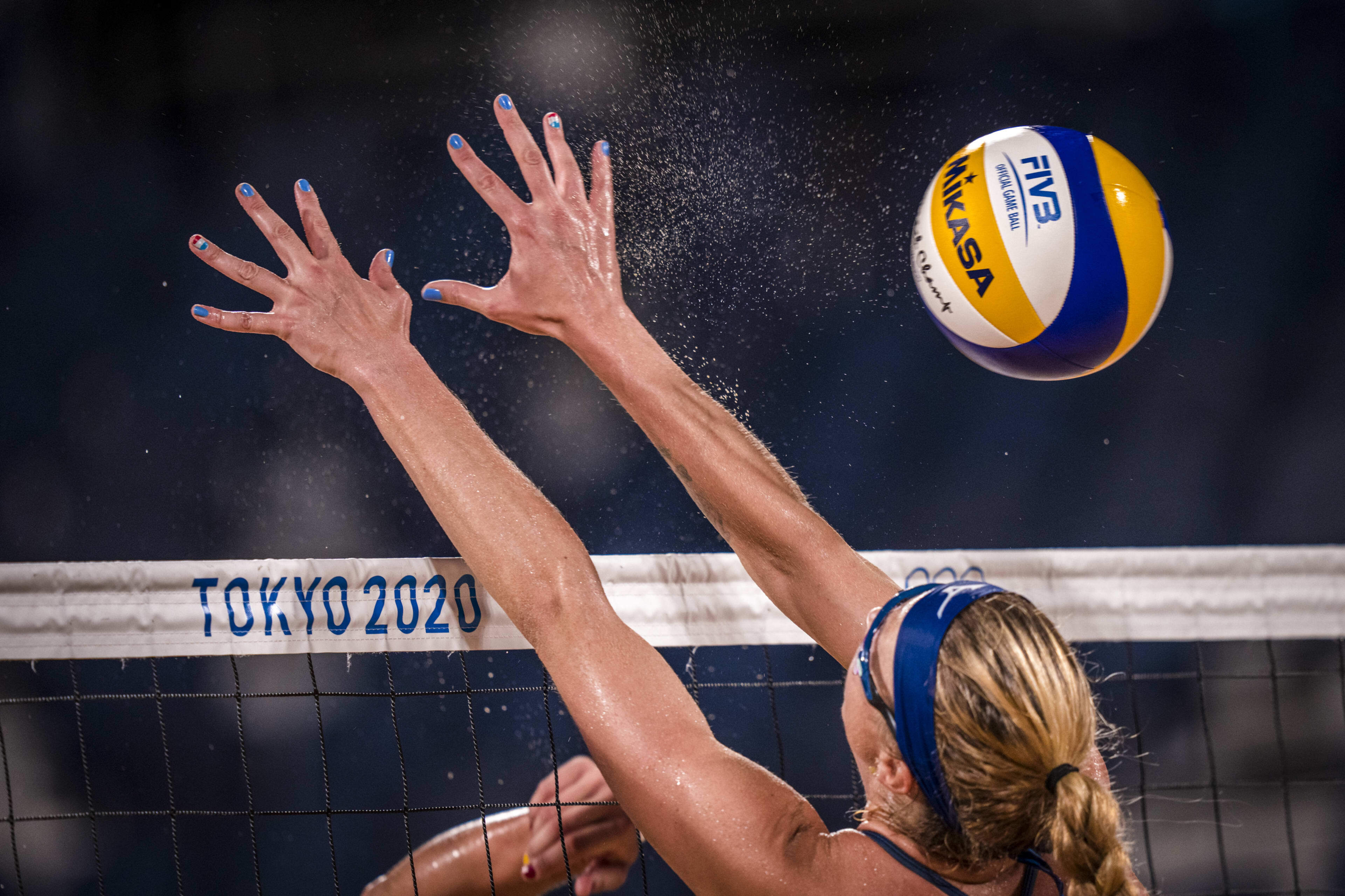Beach Volleyball Women 360°
#TakingtheStage
Day 14 | What our Olympic medalists have to say?
It’s done. Joana Heidrich and Anouk Verge-Depre became the second European team and the first Swiss women to win a medal in beach volleyball at the Olympics.
The scene of them stepping on the podium at the Shiokaze Park Stadium was the culmination of five years of hard work and full commitment to pursuing a dream they both had since they were kids.
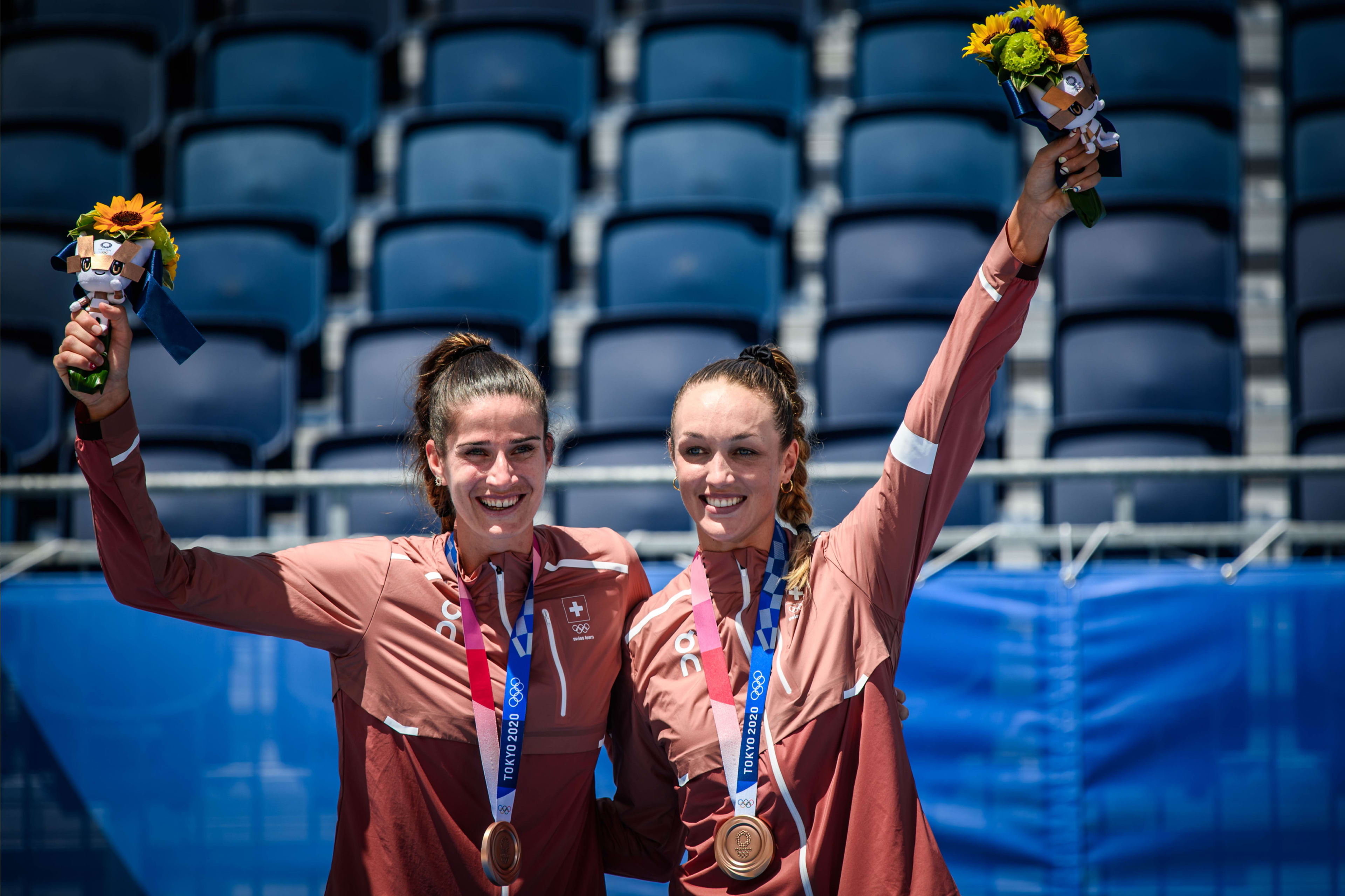
Stepping on the podium is always an unforgettable moment for athletes of any sport and in Tokyo, it carries even more weight after everything the entire world has gone through over the last year. It’s when they make their families (and don’t forget both Joana and Anouk have younger siblings who are also beach volleyball players), friends and their entire country proud.
After winning the medals, the Swiss, of course, did interviews (a lot of them!) and we selected the best parts of what they had to say in such a special moment.
Verge-Depre: “It’s incredible. This journey started several years ago with us watching the Olympics, admiring the performance of those incredible athletes and thinking it was something we wanted to do one day. It’s really a childhood dream coming to reality. It takes a lot of investment, we have a big team behind us. I’m really proud and I hope kids in our country see this medal and get inspired to play our sport too.”
Heidrich: “It’s hard to believe we won this medal. The semifinal wasn’t our day but we promised we would fight back and we did. These were very difficult days to me because I’m a very emotional player. When I was a kid, I saw the guys, (Patrick) Heuscher and (Stefan) Kobel, winning a medal and since then it’s become my dream. We made it as a team. These were hard three weeks here but we pushed ourselves and had our entire team and our friends and family behind us even though most of them couldn’t be in Tokyo. It was amazing.”
Well said, ladies! Congratulations!
Day 13 | When bronze looks like gold
Anyone who’s been following sports for a little while knows it – bronze medal matches can be the most brutal one for athletes.
More often than not, there’s not enough time to physically and, most importantly, mentally recover from a tough semifinal loss and it can be hard for athletes to find motivation to fight shortly after what was possibly the biggest setback of their career.
Motivation, however, should not be a problem for Tina Graudina/Anastasija Kravcenoka and Joana Heidrich/Anouk Vergé-Dépré when they meet for the final spot at the podium in Tokyo. For similar (and some different) reasons, Latvians and Swiss will play the most important matches of their lives at the Shiokaze Park Stadium and whoever wins bronze will feel as if it was gold.
Tina and Anastasija have already put their names in the history of Latvian Olympic sports. The first women to represent their country in beach volleyball in the Games, they can end an already historic campaign in their first of presumably many Olympics with a medal.
The presence of their compatriots (and good friends) Edgars Tocs and Martins Plavins in the men’s bronze medal match should also boost their motivation as they could make of Latvia the only country to win medals in both genders in Tokyo.
Anouk and Joana have already achieved the best campaign of a Swiss female team at the Olympics but becoming the first women to step on the podium would certainly help them writing their names in pen in the country’s history.
It would also be a strong statement about the great work Switzerland has been doing in women’s beach volleyball, qualifying two teams that entered the Tokyo Olympics as medal contenders but unfortunately met way too early in the elimination round.
This has been a historic edition of the Olympics with two women’s teams among the top four for the first time and we wish both of them could take well-deserved bronze medals home. But only one can do it, so may the best win!
Day 12 | What’s next for the European beach women?
The quadrennial period in which the Olympic Games are played is always the most anticipated by beach volleyball fans from around the world as nothing beats the feeling of watching their favorite teams perform at the greatest stage of international sport.
The period right after the Games, though, is normally a very busy and interesting one as well as it’s when several decisions that are going to shape the international scenario for years to come are made.
After four (in this case, five) years of work, players tend to reevaluate the current stage of their careers following the Olympics and decisions regarding potential retirements and partnership changes are normally the first to drop.
Things have been relatively quiet on the women’s front so far, especially because the Olympics are still ongoing, but it’s absolute possible (and likely) that some news come out on that end over the next few days.

Spanish Elsa Baquerizo and Liliana Fernandez, for example, have already indicated they might not be together in the near future. Elsa, who turned 34 less than two years ago, has other plans for her personal life and might step away from the sand soon.
“We’ve accomplished so much together, we’ve been to three Olympics…There will be a break, for sure. I want to start a family and have other goals. That’s the idea,” she said.
German blocker Margareta Kozuch, who’s also 34, informed she still plans on continuing on the sand for the next few years. After captaining the German volleyball national team, she moved to beach volleyball in 2017 and has made it to the Olympics in her first attempt.
Margareta Kozuch“It’s a bit early to say when my beach volleyball career is going to end. It’s been a lot of fun and I’m just growing every time. Beach volleyball is a sport I really love to play.”
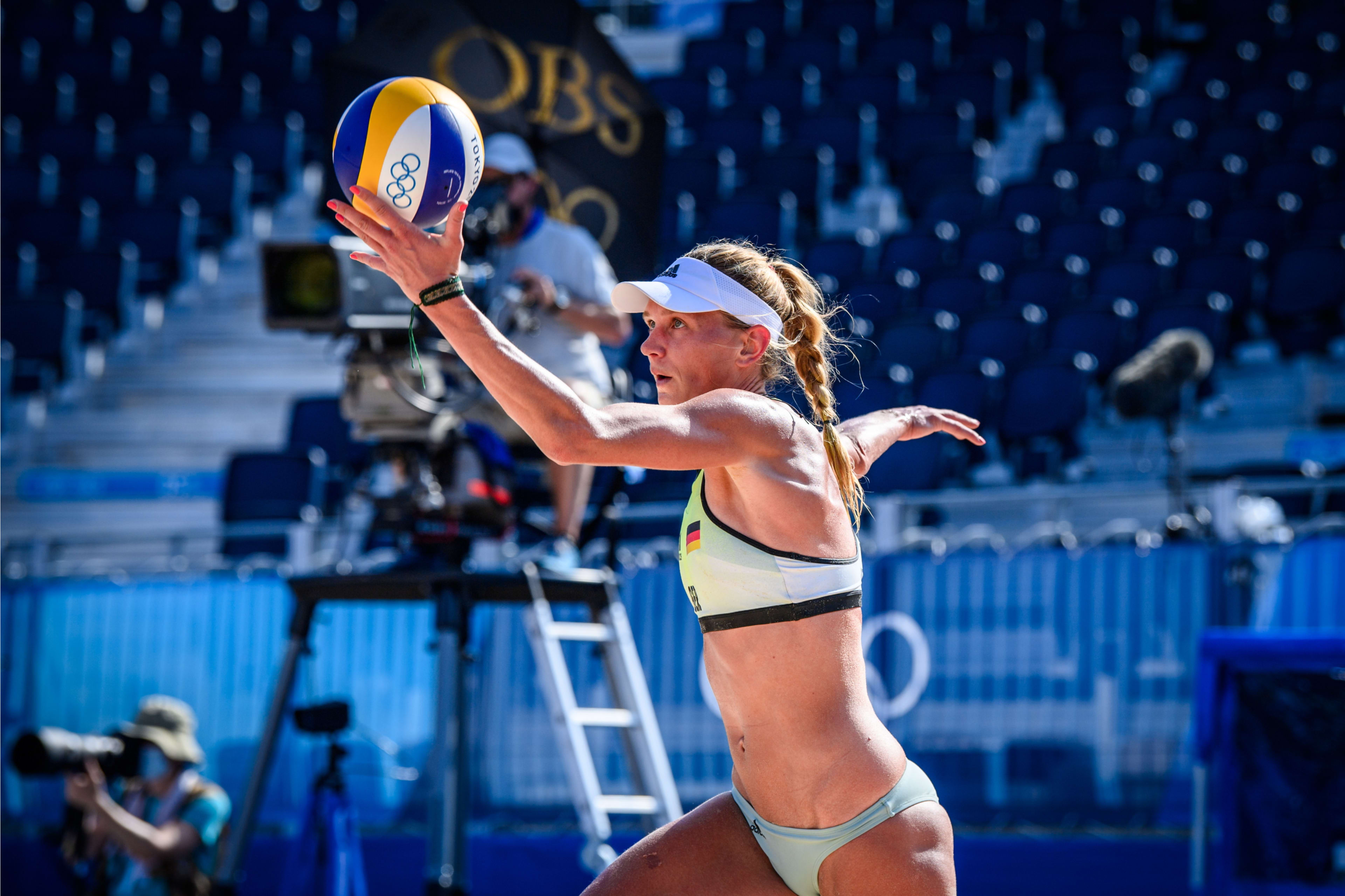
Her partner, the legendary Laura Ludwig was a little more mysterious when asked about her future. She mentioned her desire to compete in Paris in 2024 and extend her Olympic appearances to five, but refraining from committing to it.
“Paris is a really nice city. And it's really close to Germany. But right now, there's nothing to say about this. It’s too early and we put everything until now, everything 100%. And what comes after we will see and we go with the circumstances. Until now, we’ve been focusing on Tokyo. We haven’t given further tournaments any thoughts.”
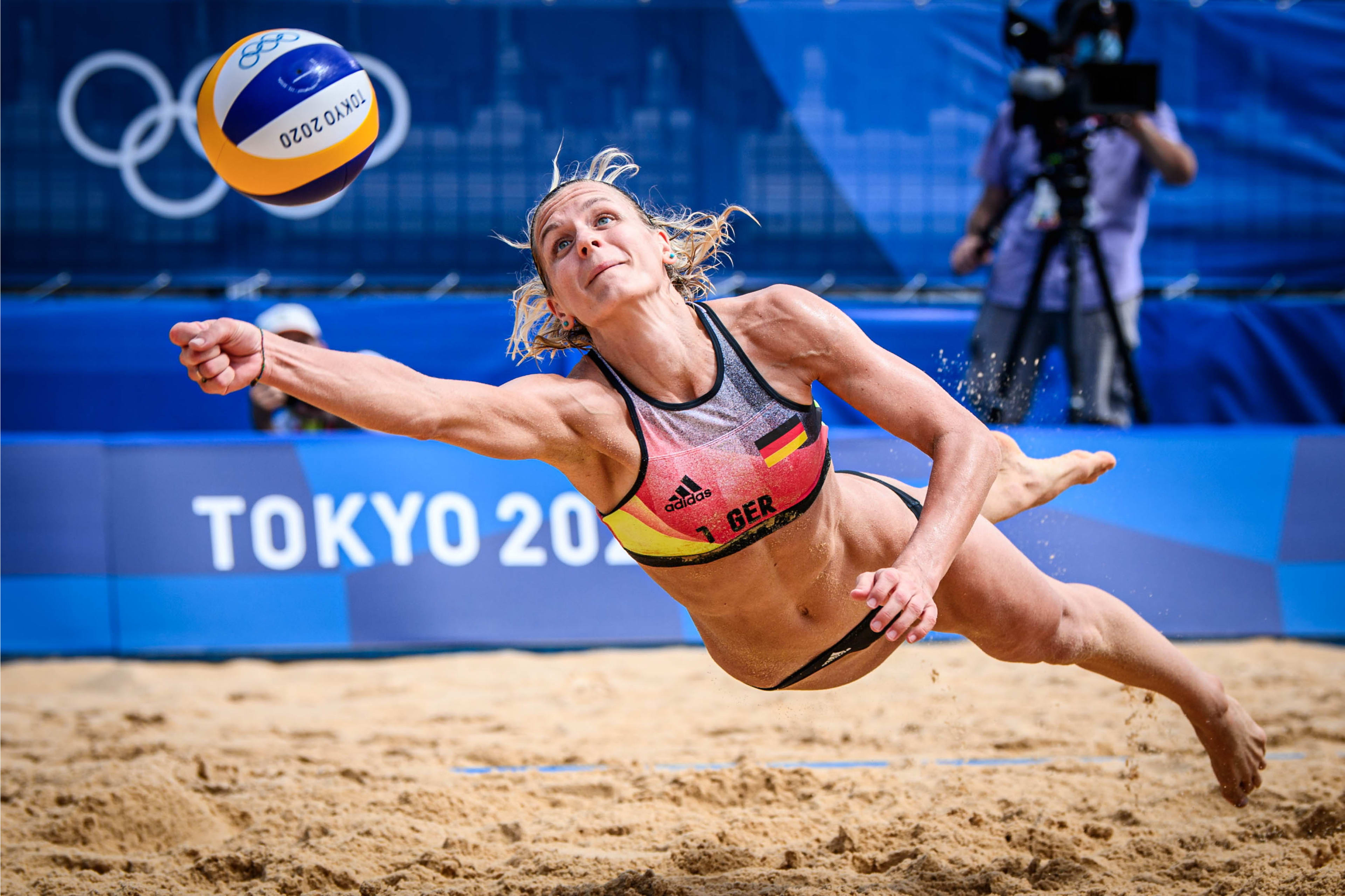
Let’s see what the future holds for the stars of our sport!
Day 11 | Getting to know the European Olympic semifinalists
Europe has advanced two women’s teams to the semifinals of the Tokyo Olympics for the first time and the entire continent is excited with the potential of a first all-European gold medal match taking place on Friday at the Shiokaze Park Stadium.
Latvians Tina Graudina and Anastasija Kravcenoka and Swiss Joana Heidrich and Anouk Verge-Depre will have extremely difficult opponents on their semifinal matches on Thursday and in order for you to prepare accordingly to support them, here’s all you need to know about the four players that will do their best to take Europe to the top of the podium in Japan.
Anouk Verge-Depre (Switzerland)
Age: 29
Hometown: Bern
Height: 185cm
Position: Defender (left)
Tokyo Stats: 116 points (108 attacks, seven aces, one block) and 68 digs
Past Olympic Experience: Rio 2016 (ninth with Isabelle Forrer)
International Results:
2020 CEV EuroBeachVolley Champion
Winner of two World Tour events (Xiamen-2016 and Moscow-2019)
2012 U21 World Champion
Did You Know? Her younger sister, Zoe, also plays beach volleyball and the two were partners at the 2019 EuroBeachVolley, finishing ninth.
Joana Heidrich (Switzerland)
Age: 29
Hometown: Zurich
Height: 190cm
Position: Blocker (right)
Tokyo Stats: 86 points (52 attacks, 17 aces, 17 blocks) and 28 digs
Past Olympic Experience: Rio 2016 (fifth with Nadine Zumkehr)
International Results:
2020 CEV EuroBeachVolley Champion
Winner of three World Tour events (Xiamen-2015, Sochi-2016 and Moscow-2019)
2011 U21 World Champion
Did You Know? Her younger brother, Adrian, is also a beach volleyball player and finished 17th in Tokyo with partner Mirco Gerson.
Tina Graudina (Latvia)
Age: 23
Hometown: Riga
Height: 184cm
Position: Blocker (left)
Tokyo Stats: 105 points (76 attacks, 17 aces, 12 blocks) and 22 digs
Past Olympic Experience: First Olympics
International Results:
2019 CEV EuroBeachVolley Champion
Winner of the 2019 Olympic Qualification Tournament
2015 U18 European Champion
2016 U22 European Champion
Did You Know? She spent most of the last four years living in the United States as she went to college at the University of Southern California, where she won the National Championship last May and was coached by Sydney 2000 Olympic champion Dain Blanton.
Anastasija Kravcenoka (Latvia)
Age: 24
Hometown: Daugavpils
Height: 179cm
Position: Defender (right)
Tokyo Stats: 72 points (66 attacks, six aces) and 50 digs
Past Olympic Experience: First Olympics
International Results:
2019 CEV EuroBeachVolley Champion
Winner of the 2019 Olympic Qualification Tournament
2016 U22 European Champion
Did You Know? She is one of the most active beach volleyball players on social media and creates a lot of fun and interesting content showing her daily routine and challenges on Instagram.
Day 10 | Previewing the quarterfinals
The first ten days of the Tokyo Olympics went by really fast and we’re already in the quarterfinals. Europe has advanced three women’s teams to the top eight for a third-straight Olympics (there were actually four duos from the continent in the quarterfinals in London 2012) and is in strong contention for medals at the Shiokaze Park Stadium.
At this stage of the tournament, there are no easy matches and most meetings are somewhat unpredictable, but we’ll try our best to provide all the info you need (and maybe some you didn’t really need, but we thought it was kind of cool) to follow the matches and support our European teams as they try to squeeze in the medal rounds.
Ludwig/Kozuch (Germany) x Ross/Klineman (USA)
The Germans weren’t lucky at all in their draw and will face one of the stronger candidates to win gold in Tokyo. Ludwig and Kozuch will need to do better than they did the two times they faced the Americans before, in which they were downed in two sets, but if there’ one place they would want to do that, this place is certainly the Olympics.
Both teams are built exactly the same, reuniting a legendary beach Olympic medalist (Ludwig and Ross) and a former indoor star who recently switched to the sand (Kozuch and Klineman). The Americans are taller and more physical, so the key for the Germans will be playing smartly and efficiently.
Graudina/Kravcenoka (Latvia) x Bansley/Brandie (Canada)
The first Latvian women to compete at the Olympics are set to meet an experienced and strong Canadian team. Historical retrospect, in this case, favors Graudina and Kravcenoka as they won both previous meetings with Bansley and Brandie, one of them just two months ago – but the matches went to three sets every time, indicating that the two teams play at a very similar level.
The Canadians are more experienced, and that made a difference in their Round of 16 match with Americans Claes and Sponcil. Graudina and Kravcenoka have been running a dynamic and creative offense and it’s important they continue to do so because the Canadians can become a very tough team when Brandie gets her blocking going and Bansley digs balls.
Heidrich/Verge-Depre (Switzerland) x Ana Patricia/Rebecca (Brazil)
This is expected to be an extremely physical match as Heidrich and Ana Patricia are among the tallest and most powerful players in the tournament. The Brazilians won the first two matches between the teams but those date back to 2019 and were both decided in three sets.
The Brazilians are coming from their best match in the tournament in the Round of 16, but had some struggle on pool play, meaning that the Swiss will have a good chance if they start strong and hit their opponents’ confidence. Heidrich and Verge-Depre defeated compatriots Betschart and Huberli in the Round of 16 in one of the most difficult match of their careers and are ready to cause more damage.
Good luck, ladies!
Day 9 | The Olympic pride
It’s kind of odd, in a certain way, that the Olympics mean so much for beach volleyball players. Unlike 99.9% of the tournaments they play in their careers, they won’t get any prize money for competing at the Games. They won’t actually even be awarded ranking points for their participations.
But if there’s one thing the Olympics bring them more than any other event is the strongest possible feeling of pride for representing their countries. Ask any one of the players competing in Tokyo and they will tell you that.
The Olympics make beach volleyball players feel like part of a unique (sometimes enormous, sometimes small) team that will do anything to make their compatriots proud while competing against the best athletes in the world. They’re not playing for themselves of for their teams, but for their entire countries instead.
In any international event, a player’s jersey will carry their names and the three-letter acronym for their countries. In the Olympics, there’s a little something else that each and every athlete is proud of displaying – their nation’s flag.
Beach volleyball athletes are so proud of representing their countries that they find a variety of ways to express that. Nail art is hands down the most popular of them. Players will paint their country’s flag or at least use their colors to make it very clear which nation they’re representing when they’re not on their match uniforms.
A few accessories can do the trick too. Italian defender Marta Menegatti was seen playing with earrings that had the Italian flag inside a heart.
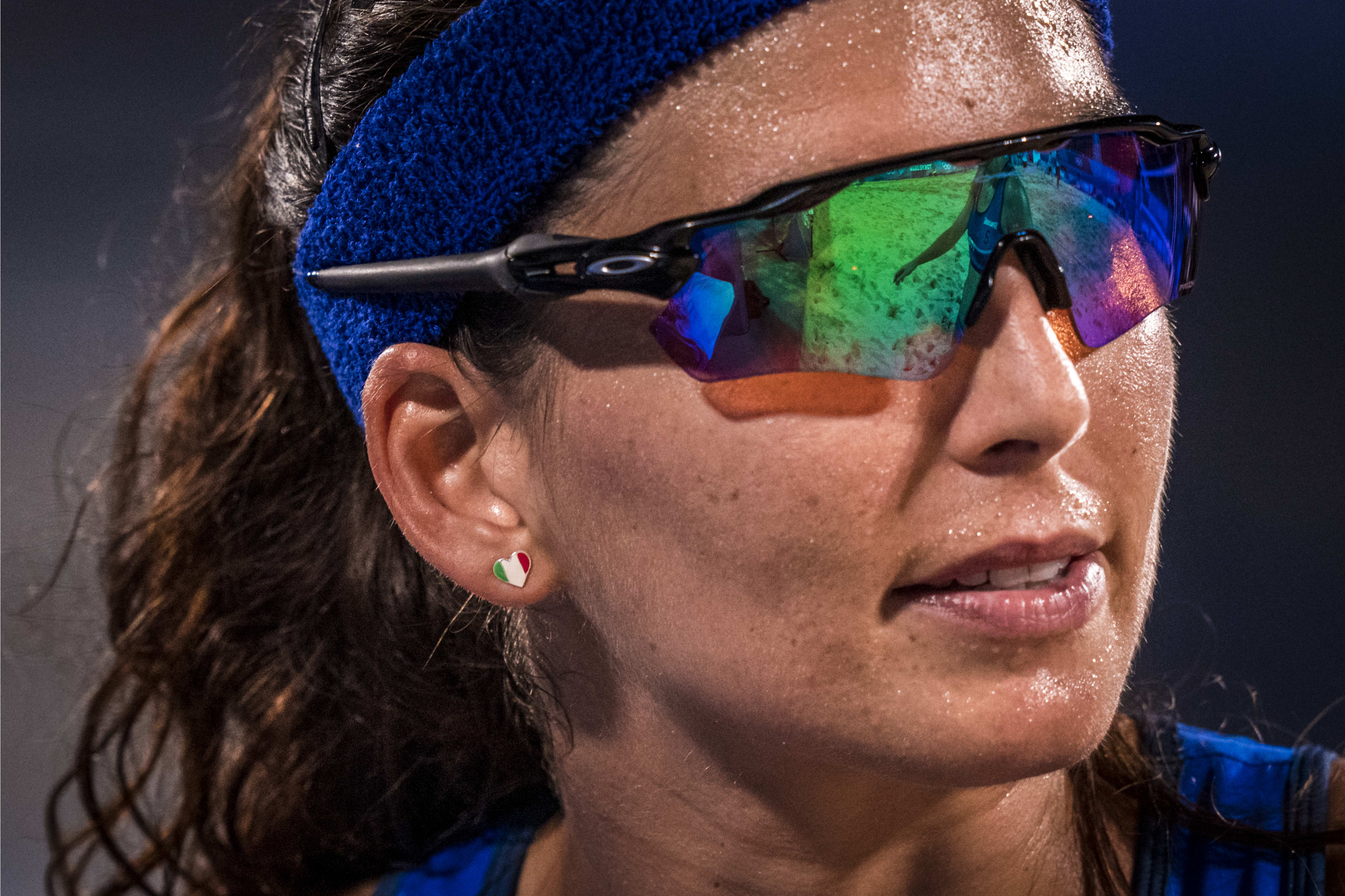
Tattoos are very popular as well and more recently the popular therapeutic kinesiology tapes have been used to showcase athletes’ love for their countries too.
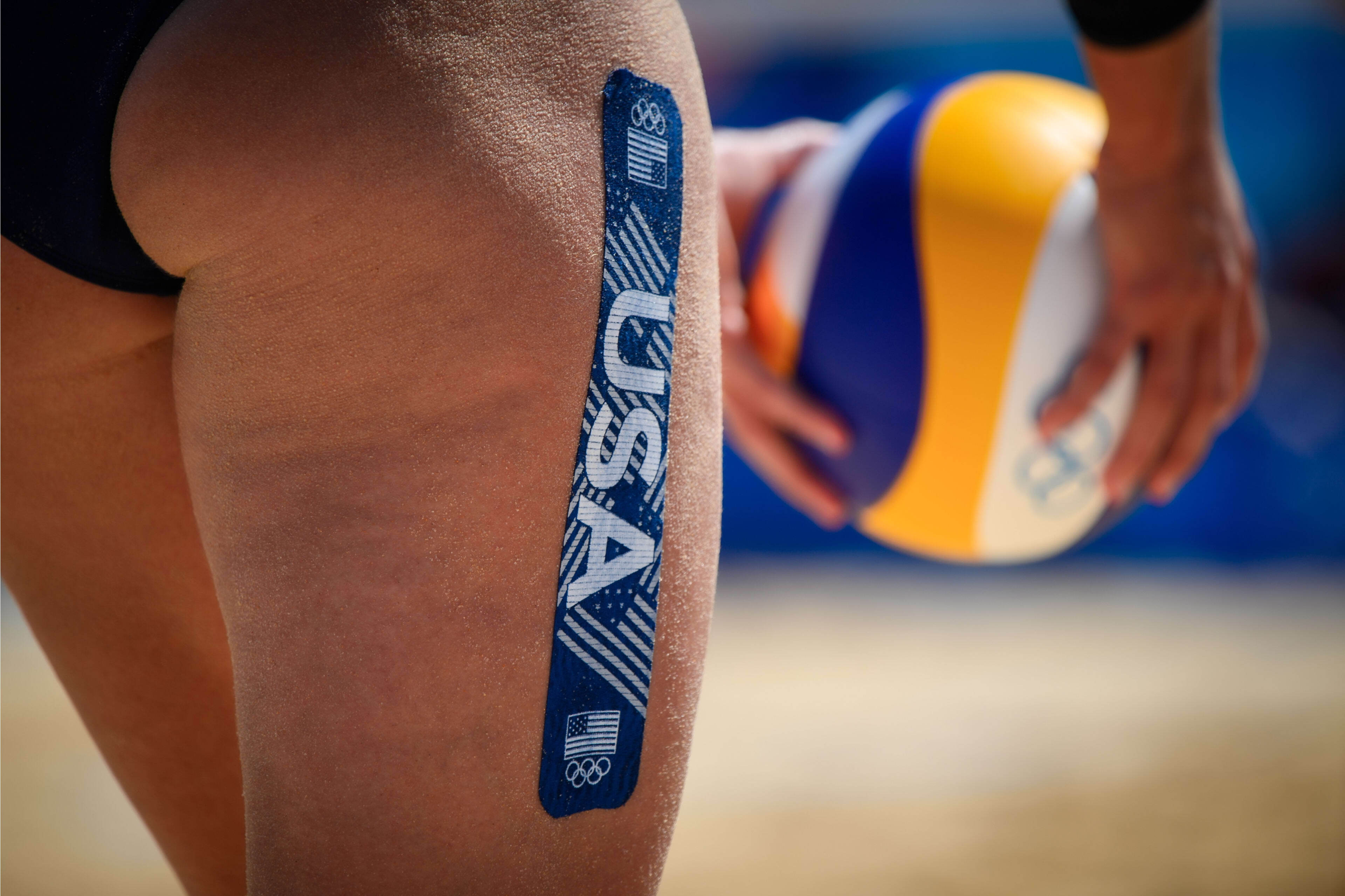
Whatever way you choose to express it, represent your country with your heart. It’s one of the most beautiful things athletes can do.
Day 8 | Stats the way we like it
The conclusion of pool play at the Tokyo Olympics marks the end of the first stage of the beach volleyball tournament of the Games, but also the start of a new phase in which teams will have no more margin for errors.
With each team having played at least three matches, it’s also a good moment to have a general overview of what’s going on – which teams showed strength and which struggled – and also to identify the players who are standing out for their individual performances.
We’ll use the stats to guide us as we navigate this, but here’s a spoiler – the Europeans are doing really well!
The continent has the top three scorers of the women’s tournament so far with Olympic debutant Tina Graudina of Latvia leading the way with 75 points scores in eight sets. The 2019 EuroBeachVolley champion has registered 56 attacks, five blocks and 14 aces to rank ahead three-time Olympians Liliana Fernandez of Spain, with 70, and Madelein Meppelink of the Netherlands, with 68.
Graudina’s 56 attack points are good to put her on top of the standings in the skill as well, ahead of Switzerland’s Anouk Verge-Depre’s 55 and Meppelink’s 54.
As you might have imagined by now, her 14 aces are also the highest mark in the entire tournament. Brazil’s Rebecca Cavalcanti scored 11 times from the service line while Swiss Joana Heidrich and American Sarah Sponcil tie for third with 10 apiece.
The blocking list has a triple tie at the top, with Dutch Katja Stam matching Brazil’s Ana Patricia Ramos and Canada’s Sarah Pavan with 15 stuffs. Fernandez is right behind them at 14, followed by Russian Olympic Committee’s Nadezda Makroguzova, with 12.
Stam’s big block has certainly helped her partner Raisa Schoon play defense behind it as the 19-year-old is the top-ranked in digs with 46. Verge-Depre, who was a blocker until five years ago, and Spain’s Elsa Baquerizo complete the top-three with 41 and 39 digs, respectively.
Day 7 | The incredible Olympic mothers
The Olympics are longer than any other beach volleyball tournament. While the EuroBeachVolley and World Tour events don’t last more than seven days, the competition in Tokyo has just reached that mark – and there’s another full week to go for the teams that make it to the medal rounds.
And that doesn’t even include the pre-Games period, much-needed for testing, practices and adjustments to the weather and time-difference, which probably had players in Tokyo for at least another week.
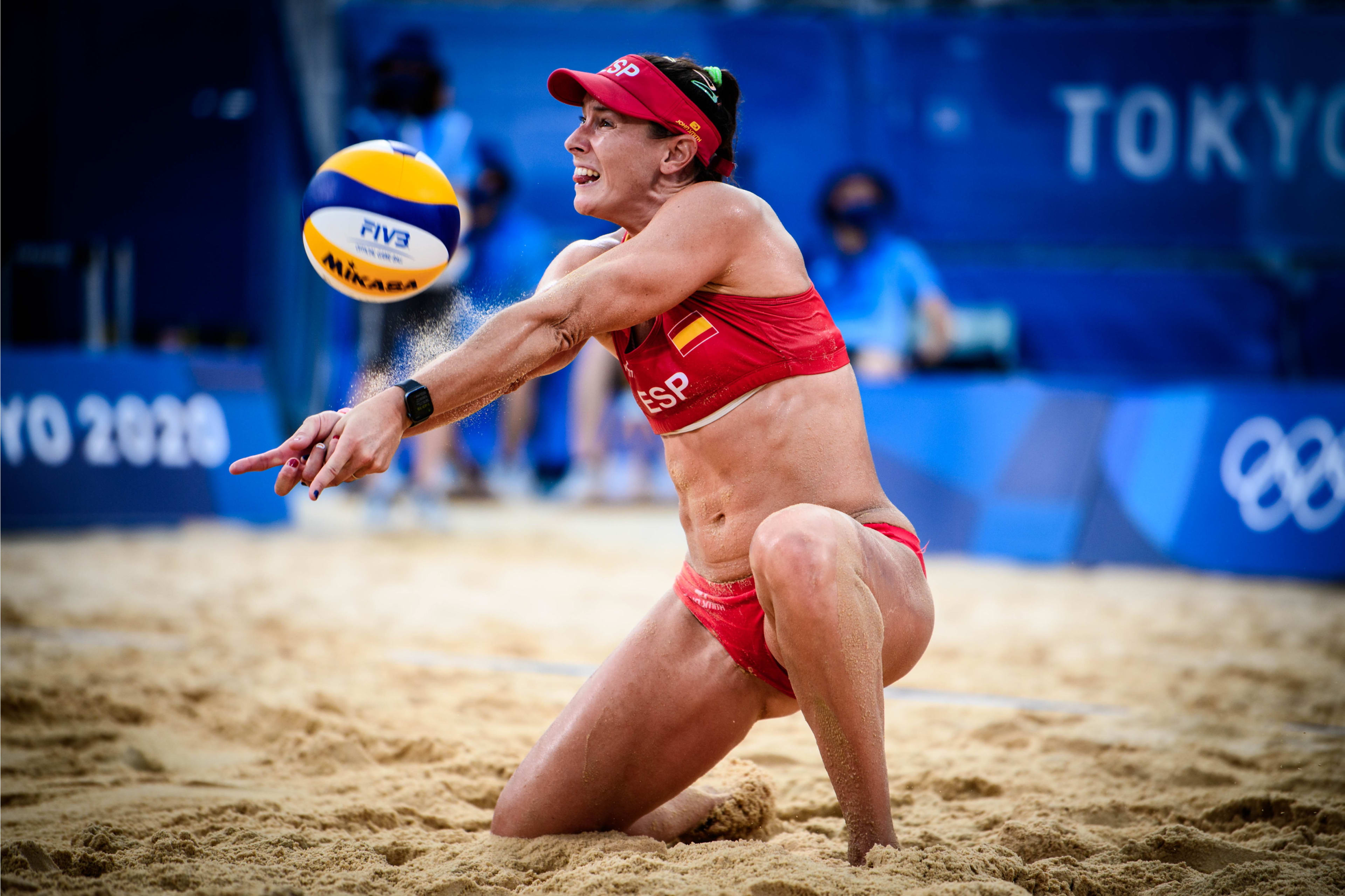
For athletes, in general, but beach volleyball players even more, any extra day away from their families and their homes are extremely difficult to handle. For three European athletes who are currently in Tokyo, the distance might hurt even more as they’re mothers to beautiful kids.
Dutch veteran Sanne Keizer is the proud mom of the adorable twins Puk and Kees. Before going to Tokyo, she posted on Instagram saying how difficult it would be to be away from them and her husband, beach volleyball coach Michiel van der Kuip, for so long.
Olympic champion Laura Ludwig, who’s also married to a beach volleyball coach, Imornefe Bowes, welcomed the beautiful Teo three years ago. The German star left the little one with his grandparents in order to chase her second Olympic medal, but, for sure misses him while in Tokyo.
Spanish Liliana Fernandez is the third European woman to compete in the Olympics as a mother. She gave birth to Saul on August 2017 and returned in time to rejoin longtime partner Elsa Baquerizo and make it to the third Olympics with her.
Puk and Kees will be the first to get mamma back as Keizer and partner Meppelink exited the tournament at the end of pool play but we believe Laura and Lili would be forgiven for their long absence by Teo and Saul if they returned home with a round, golden toy for them, right?
Day 6 | When the Olympic dream ends
The beach volleyball tournament of the Tokyo Olympics is yet to complete its first full week but we already have the first European team eliminated – Germans Karla Borger and Julia Sude exited the event after playing all their three pool matches in Japan.
A few hours after the upset that set their faiths in Tokyo, the two went to social media to express how disappointed and frustrated they were with their performances in the what was arguably the most important tournament of their careers.
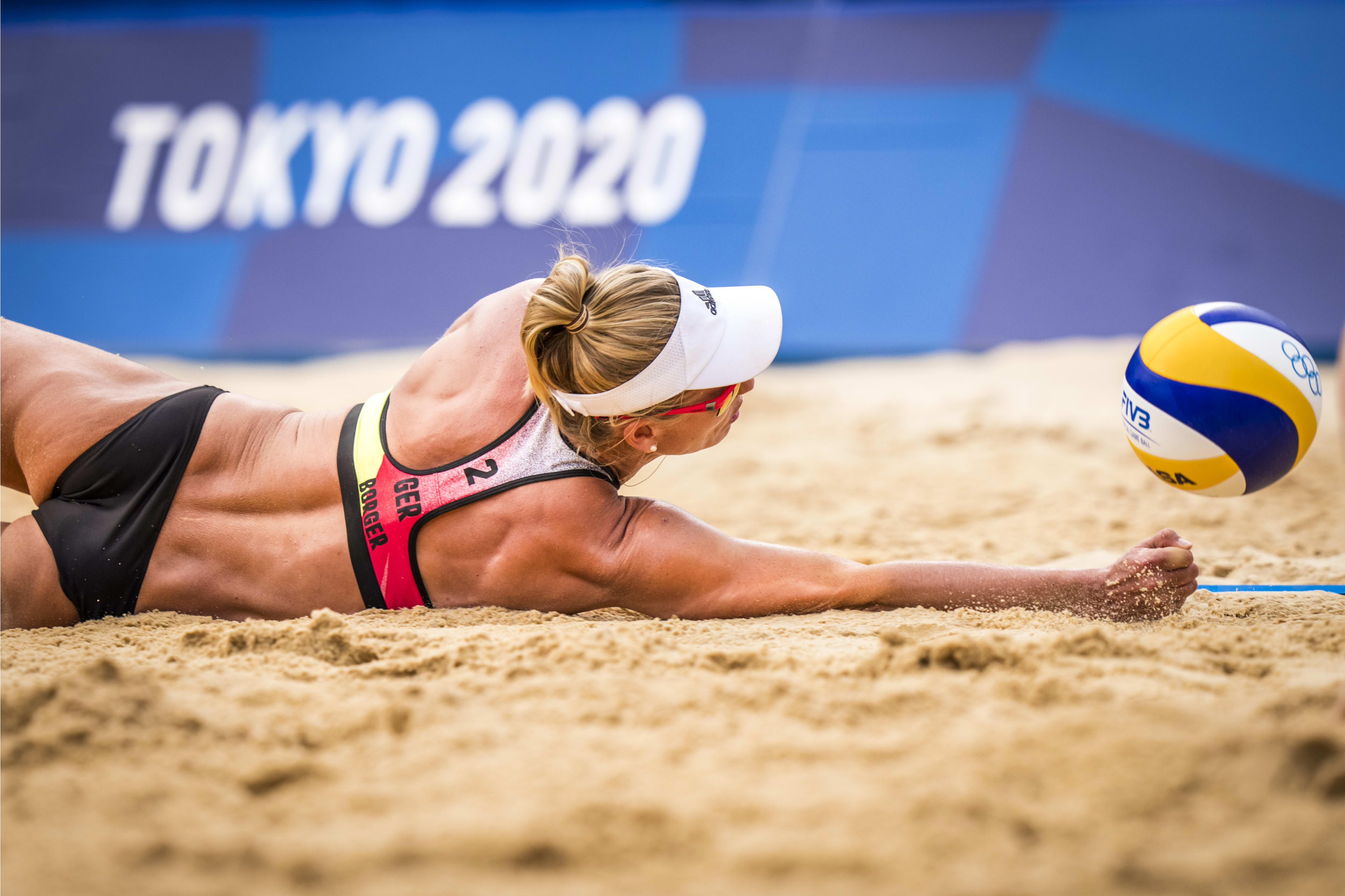
To think that all these athletes (and virtually every other, from any sport) have given up so much and fully committed to accomplishing their dreams and that they only got to enjoy it for ‘just’ three matches over the course of six days, it just makes us reflect.
Most of the 22 European beach volleyball players who qualified to the Tokyo Olympics had, at some point of their lives, to move away from the cities where they grew up to advance their careers.
All of them have been away from home, at least once, in an important date for them, some family member or a close friend.
Some left successful and more lucrative careers behind (looking at you, Maggie Kozuch!), while others postponed personal dreams, such as starting a family, for longer than they would have wanted.
For the sake of getting results and qualifying to the Olympics, a good portion of them has been forced to end a sports union with a partner they really liked at a personal level because things weren’t working on the court.
And all of them, no exceptions, had to do one or more of these things while a global pandemic affected the entire world, generation all sorts of questions and uncertainties about the future of their careers and their abilities to provide for their families.
But if you ask each one of them, we bet they answer would be the same – they’d do it all over again.
Because it’s the Olympics. And they might not have another chance at it.
Day 5 | Orsi Toth is finally an Olympian
There are 11 rookies among the 22 women representing Europe in beach volleyball at the Tokyo Olympics and while each of them is deservedly enjoying this moment, probably no one is doing so with as much enthusiasm as Italian Viktoria Orsi Toth.
For the 30-year-old, Budapest-born block, it might feel like this was long due - and it actually was.
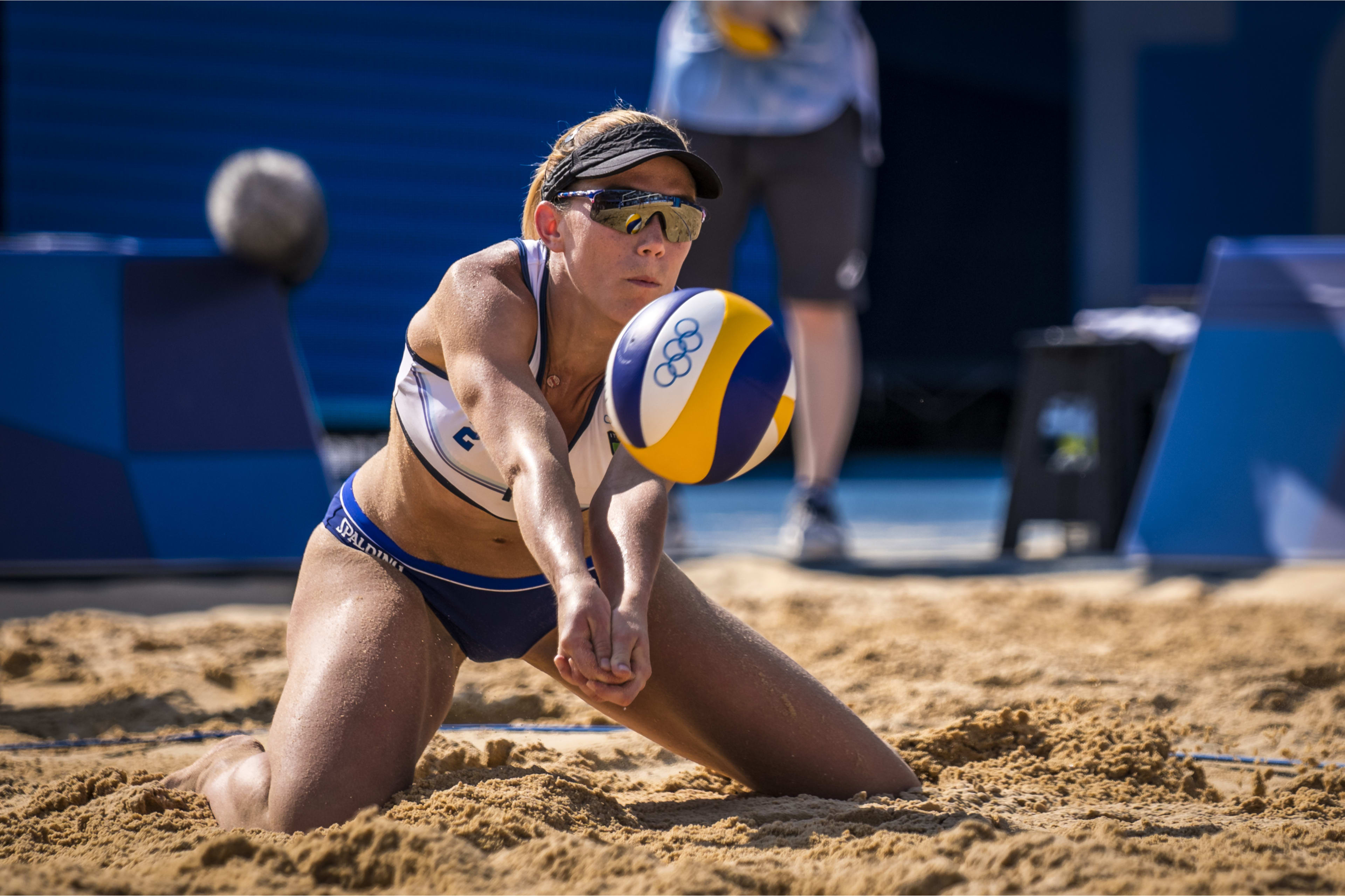
Orsi Toth and partner Marta Menegatti qualified for the Rio 2016 Games but a positive doping test returned three days before the Opening Ceremony forced the blocker to withdraw from the competition, making the defender pair with Laura Giombini instead.
With the Olympic withdraw, also came a two-year suspension that put the future of their careers at serious risk. “After what happened I decided that I would never ever play beach volleyball again in my life, I was really convinced not to come back,” Orsi Toth.
Fortunately, she changed her mind and decided to return to the sand and rejoin Menegatti. Restart, however, might actually be the right word to describe what these two faced after two years apart and with limited ranking points.
They literally started from the bottom, playing in smaller tournaments to move up in the rankings, and found their way into the elite of the sport, qualifying to Tokyo via the world rankings. “I've run after these Olympics, I've sweated until the very last drop of sweat to get here, I've suffered so much but here I finally am.”
Yes, Viktoria, here you are. Now it’s time to enjoy and make this last as long as possible!
Day 4 | The Heidrichs in Tokyo
It might be a massive feeling of pride for a parent to see their child competing at the Olympics. In short, it means they have achieved the highest level they possibly could in their sports careers. But it might, as well, be nerve-wracking to watch and cheer for them considering everything that’s always at stake in each edition of the Games.
The Heidrich family from Switzerland is currently experiencing all of this twice as siblings Joana and Adrian have both qualified for and are competing at the Tokyo Olympics right now.
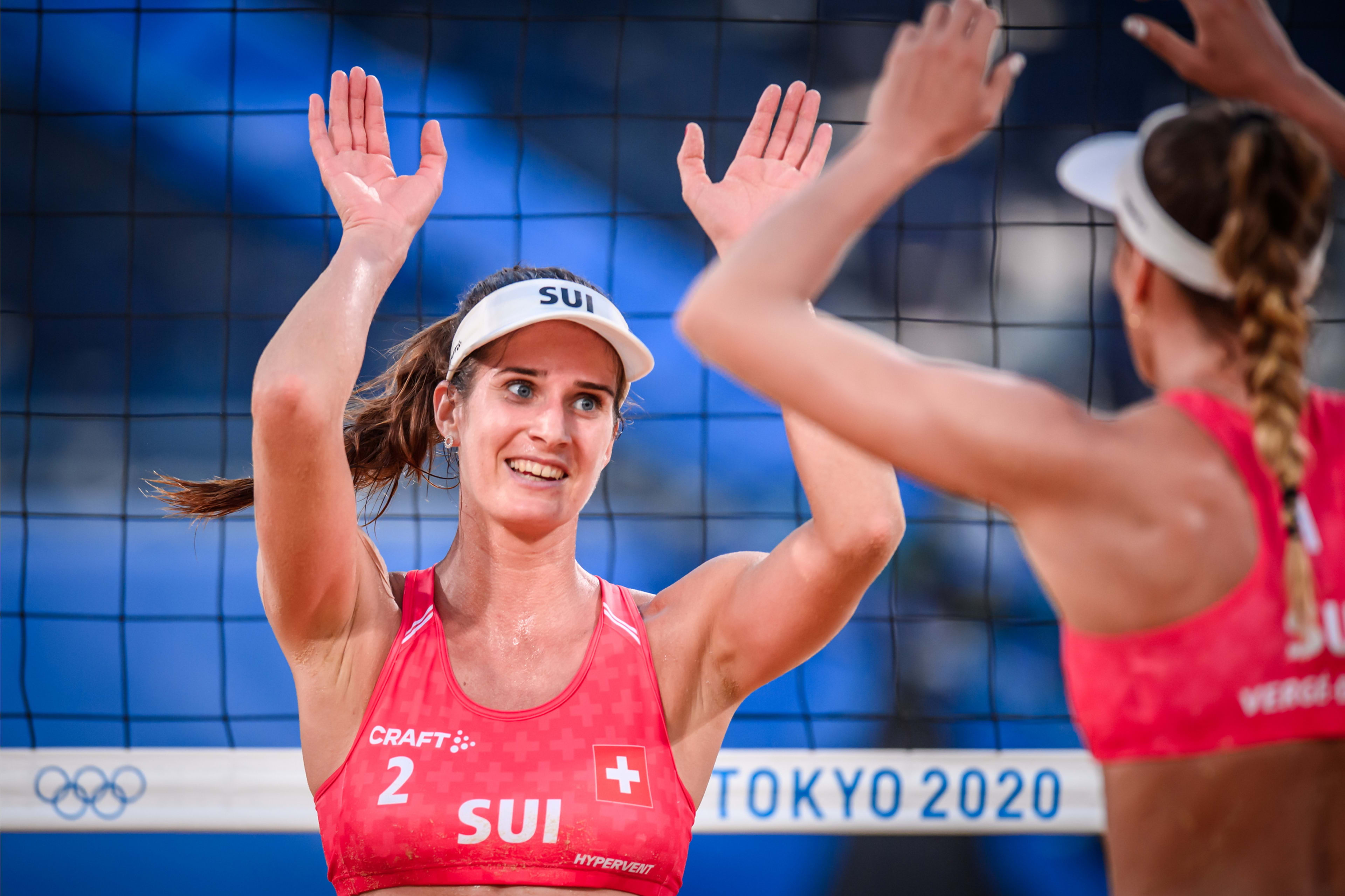
For siblings, to compete together at the Olympics, it might be a dream coming true. And we can say Swiss are kind of experts on this art as the Laciga brothers Paul and Martin did the same (with the added bonus of been teammates) in three-straight editions of the Games between 2000 and 2008.
We can’t imagine how pleasant this experience might be for Joana and Adrian, especially in an edition of the Games in which no fans and family members are allowed at the venues. They’re really privileged for having each other around in what is certainly part of the list of greatest moments in their lives and being in a position which virtually every other athlete currently residing at the Olympic Village would give up basically anything for.
It might be so exciting for them to know that they have each other to go to when celebrating a big win or winding down after a tough loss and probably even more for Adrian, a first-timer, who can rely on his older sister’s experience from five years ago in Rio.
We don’t know how long this is going to last, guys, and all we can say is – Enjoy it!
Day 3 | Graudina and Kravcenoka’s unique journey to Tokyo
The third day of the beach volleyball tournament of the Tokyo Olympics is now completed and that means each of the 24 teams women’s teams has already competed in at least one match at the Shiokaze Park Stadium.
Being part of the greatest sports event of the planet is certainly reason for great pride for each of the 22 European women who accomplished it (and that, of course, includes Czechs Marketa Slukova and Barbora Hermannova, who made the trip to Tokyo but couldn’t play due to a positive COVID-19 test) and the journeys of each of them carry their own set of uniqueness.
When the Olympic cycle started, in 2017, it was impossible to think about Tokyo 2020 without the presence of German star Laura Ludwig. Spanish Liliana Fernandez and Elsa Baquerizo, Swiss Joana Heidrich and Anouk Verge-Depre and Dutch Madelein Meppelink were all safe bets to make it to the Games too, but what about Latvia’s Tina Graudina and Anastasija Kravcenoka?
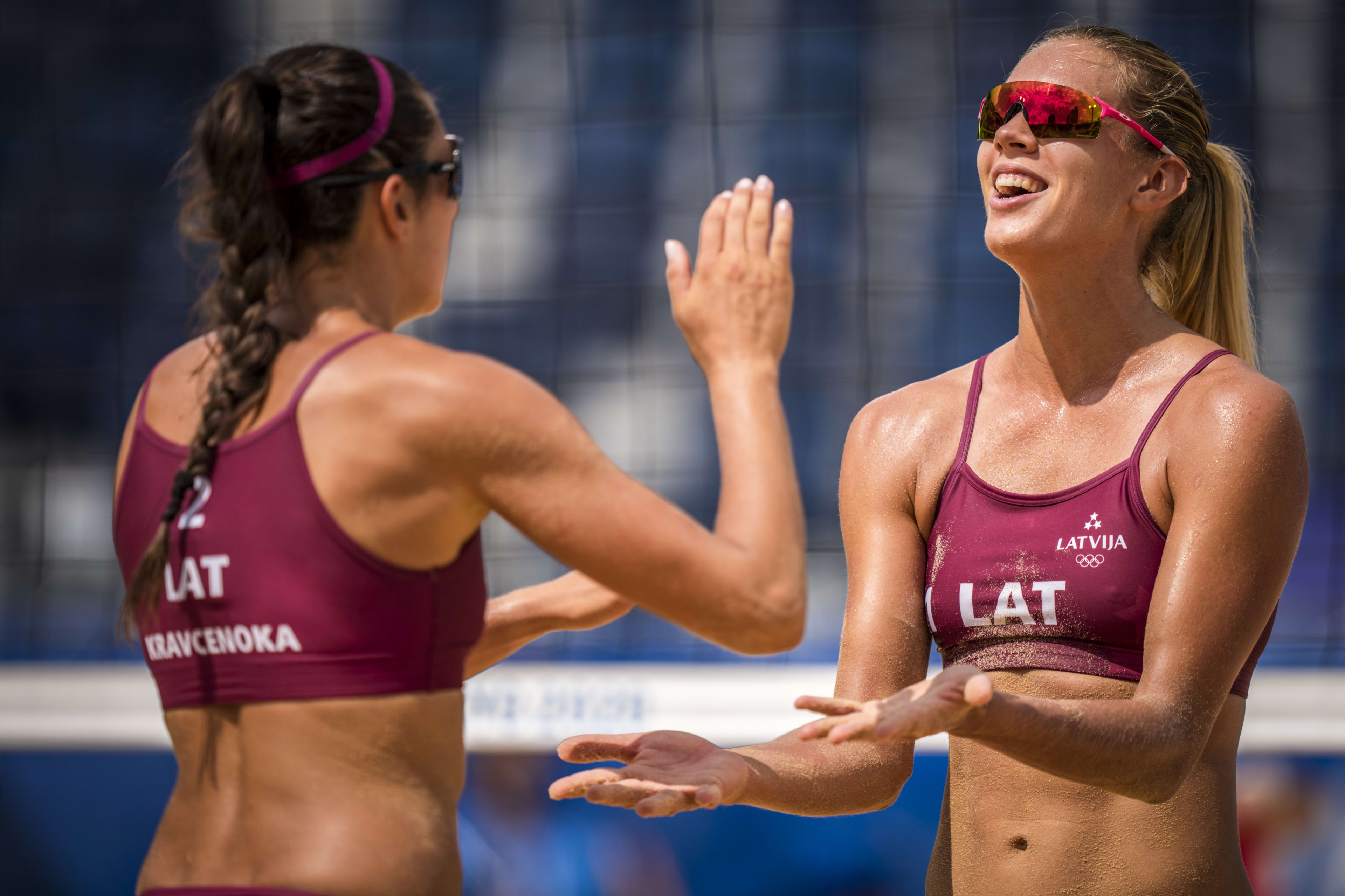
Aged 19 and 20 respectively in January 2017, when several of the teams that would play in Tokyo were formed, the two had a combined international experience of three World Tour events. There was potential, of course, as their victory at the CEV U-22 European Championship in August 2016 showed, but would they develop in time to compete against the best in the world in Tokyo?
Legendary Latvian coach Genadijs Samoilovs thought so and took on the challenge of training them with just one request – that they believed they could do what no other women’s team had done in their country and qualify to Tokyo.
It was a bumpy road for the two, who ranked 102nd in the world when they joined forces. Step by step, they were moving up in the rankings and earning their place among the best in the sport.
The year of 2019 was certainly the best they could have hoped for. Graudina and Kravcenoka appeared in the World Championship for the first time, won the gold medal at the EuroBeachVolley and, most importantly, dominated the Olympic qualifier in China where they secured their spots in Tokyo.
But it wasn’t always a bed of roses for them. A tough decision to change coaches was part of their trajectory as Gustavo Rocha came in to replace Samoilovs ahead of the team.
And unlike any other team in the world, they spent most of the time in the last four years training in different countries as Tina went to college at the University of Southern California, in Los Angeles. Can you imagine that, an Olympic beach volleyball team in which players are separated by nearly 10,000 kilometers?
It was, for sure, a unique journey for these two and now it’s time to enjoy the best part of it!
Day 2 | When idols become teammates
The Dutch beach volleyball team of Sanne Keizer and Madelein Meppelink debuted in the Tokyo Olympics on Sunday and we can guarantee you two young fans of them were glued to the television, watching every point of their match against Spanish Liliana Fernandez and Elsa Baquerizo.
No, we’re not talking about Sanne’s twins Puk and Kees, some relatives of Madelein or even someone back home in the Netherlands. Their die-hard fans are called Raisa Schoon and Katja Stam, were at the Tokyo Olympic Village and are also part of the Dutch Olympic beach volleyball team.
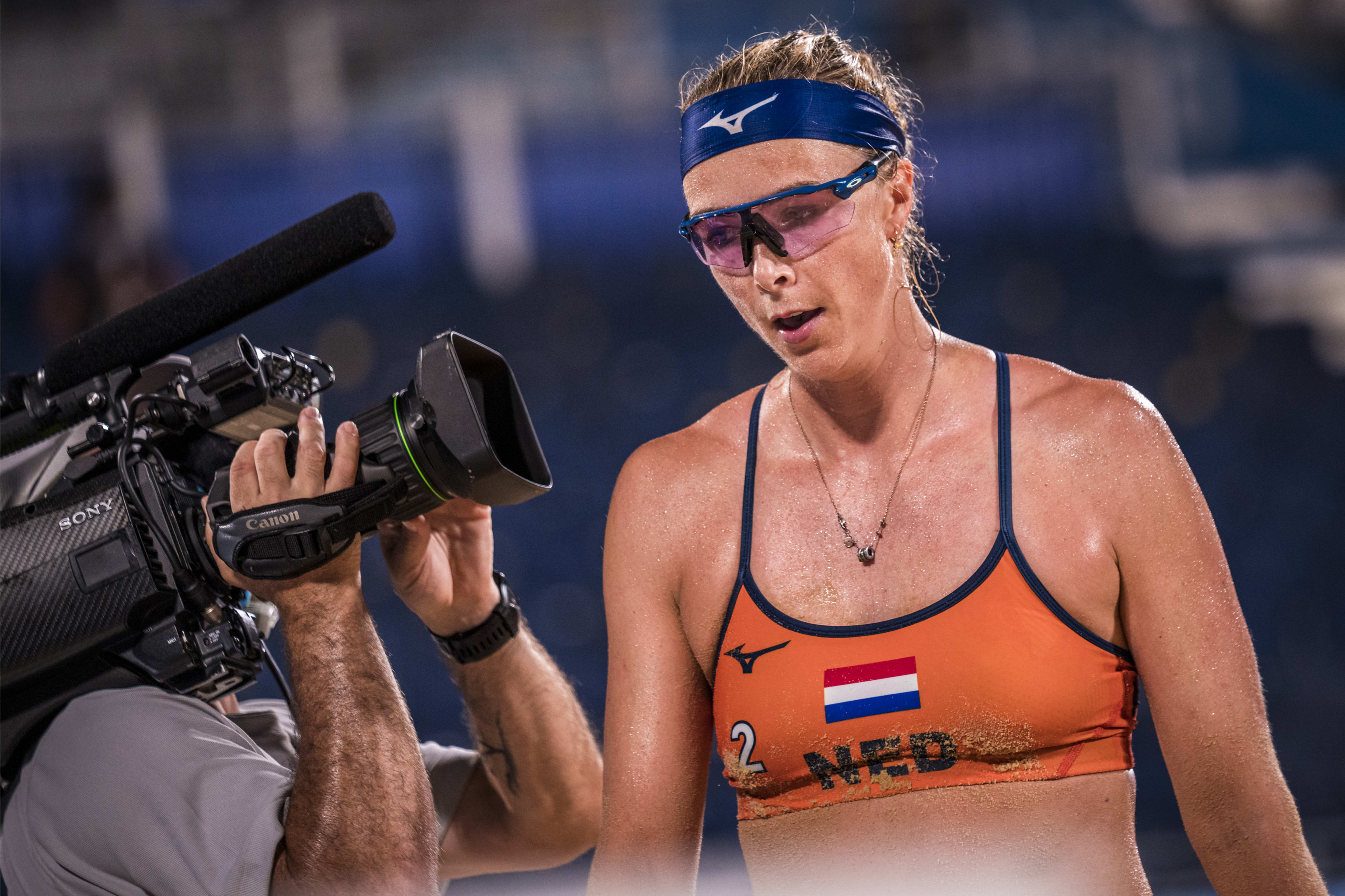
Schoon and Stam starred in one of the coolest stories of beach volleyball this summer when they won the CEV Continental Cup Final and qualified to Tokyo. At 19 and 22 respectively, they are the youngest team competing at the Shiokaze Park Stadium and, more than that, got to do it alongside two players they’ve long admired and looked up to.
Two-time Olympians and EuroBeachVolley winners, Keizer and Meppelink are among the most successful players in Dutch beach volleyball. Both Schoon, who’s part of a traditional beach volleyball family in her country being the daughter of two-time Olympian Debora Schoon and the niece of national team head coach Richard de Kogel, and Stam grew up idolizing them as confirmed by some photos shared on social media this week.
In a recent interview to Dutch media, Stam even recalled when one of those photos was taken, during a visit Meppelink made to her school in her hometown Emmen when she was just 13.
“She was preparing for the London Olympics and I remember I loved it and found it very interesting.”
A decade later, her and Schoon, who was yet to celebrate her first year of life when Keizer became a U-18 world champion back in 2002, have not only become professional players, but made it to the Olympics and got to share this moment with the players they grew up admiring.
Some things can only happen in sports. This is one of them.
Day 1 | Laura Ludwig makes history again
Competing at the beach volleyball tournament of the Tokyo Olympics will certainly create all sorts of sweet memories to each of the 20 European women who are fighting for the medals in Japan, but for one of them in particular the Games have become memorable right from the beginning.
German star Laura Ludwig has made history not once, but twice, less than 24 hours after the official start of the event in Tokyo and has already become one of the faces of beach volleyball in Japan.
On Friday evening, she led the German Olympic delegation during the Opening Ceremony being one of the country’s flag bearers and just the sixth beach volleyball player to have such an honor – the list includes two other Europeans in Portugal’s Miguel Maia in Sydney 2020 and Latvia’s Martins Plavins in London 2012.
Laura was at her best that night at the Olympic Stadium. Even though she was wearing a mask, it was clear her infectious smile was brighter than ever, demonstrating how proud and humbled she was for the opportunity of representing German athletes in such a special moment – diver Patrick Hausding and her were selected after a voting process that involved the German Olympic team and the general public.
About 19 hours later, she was back on her feet again, this time at the beautiful Shiokaze Park Stadium for her debut in the tournament alongside partner Margareta Kozuch. They ended up losing a close three-setter for Swiss Joana Heidrich and Anouke Verge-Depre, but at the moment the initial whistle was blew, she officially became the first European women to compete in four editions of the Olympic beach volleyball tournament.
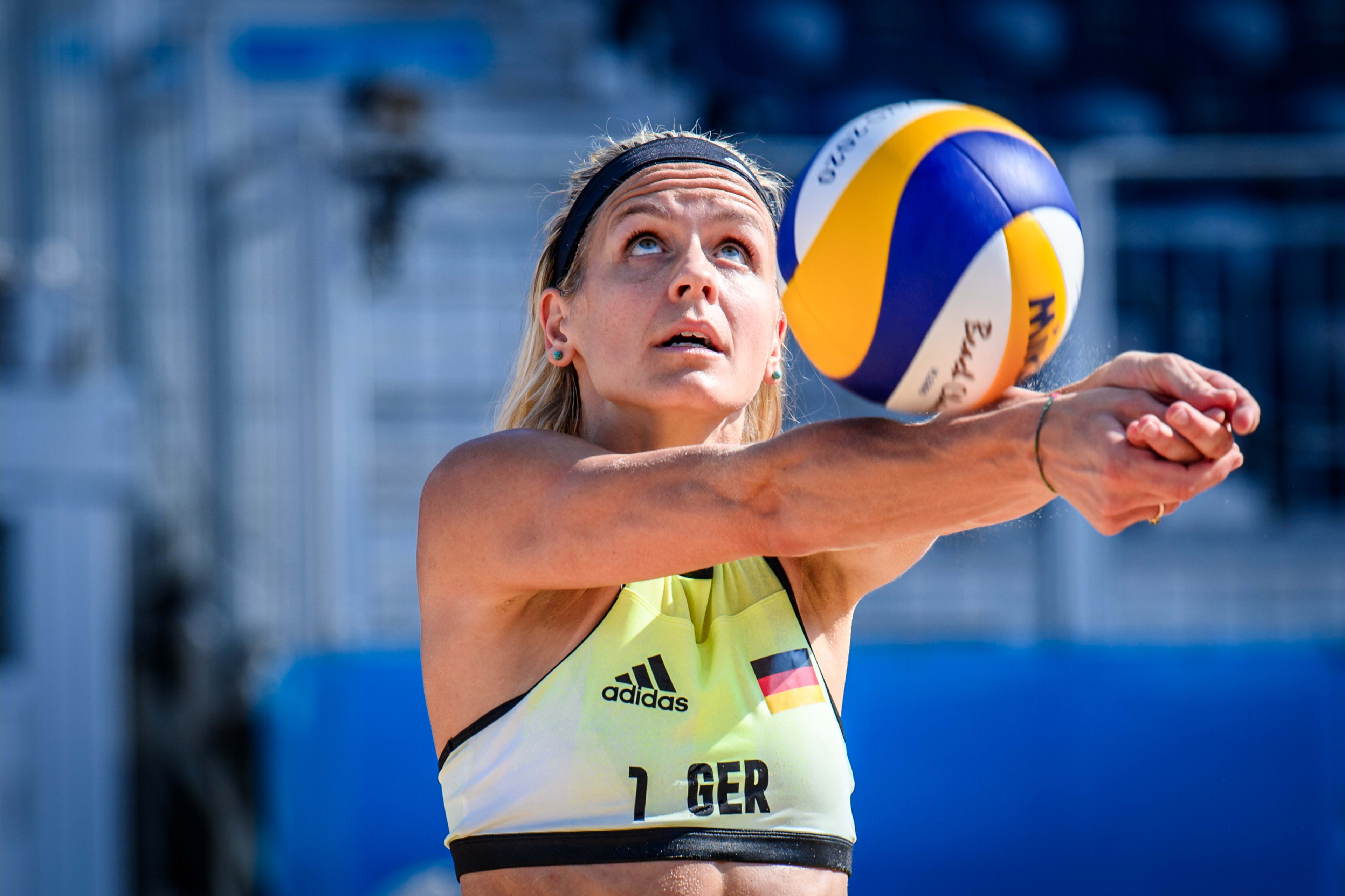
Qualifying for the Tokyo Games might look like an ordinary task to the women who became the first Olympic and world champion from Europe but a quick look back on all that happened over the past few years shows it differently.
Laura sat out of the 2018 season to give birth to her first son Teo, giving herself a late start in the Olympic qualification process. When she was cleared to play, longtime partner Kira Walkenhorst wasn’t and she had to adjust her plans and bring Kozuch. It wasn’t an easy start, but the two qualified and are now representing Europe in Tokyo.
The Tokyo Games might have just started, but Laura Ludwig is already a winner on them.
